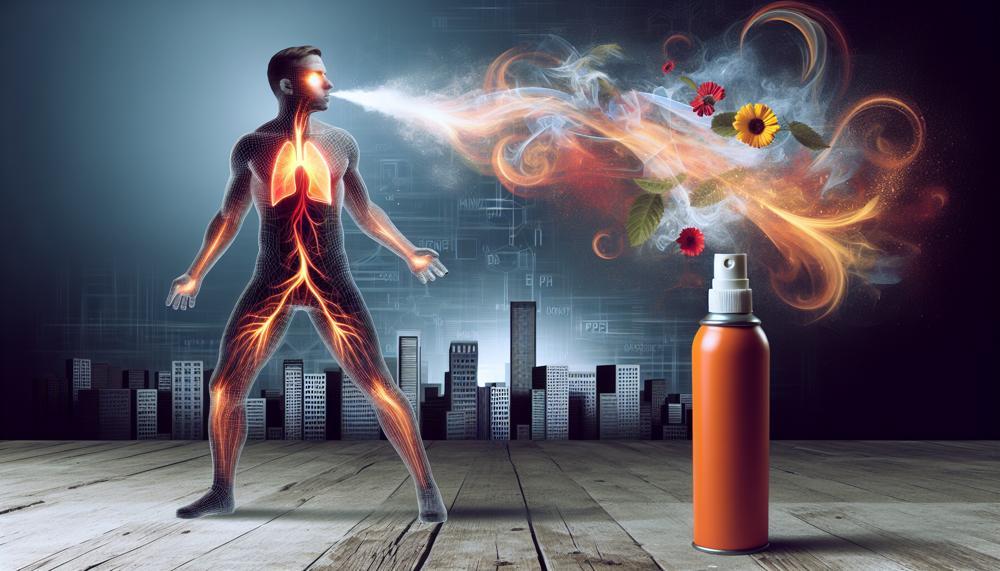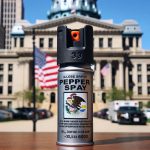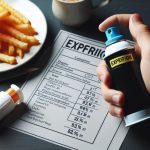Pepper spray is a ubiquitous form of self-protection, carried by many individuals as a safeguard against potential assailants. But beyond its role as a deterrent, have you ever pondered the aroma of this potent spray? Though seemingly insignificant, the scent of pepper spray can greatly impact its usage and effects.
So, what does pepper spray smell like?
Pepper spray smells like the hot pepper product it’s made from and the tri-chloroethylene used in its manufacture. The tri-chloroethylene smells like most oil-based solvents, like car engine oil. Some say it smells like garlic breath and month-old bologna sandwiches. Pepper spray is odorless, colorless, and flavorless. However, the smell can last for a few minutes to 30 minutes depending on the ventilation in the room. Inhaling pepper spray can cause coughing, difficulty breathing, nasal and throat irritation, and runny nose. More severe injury is possible including corneal abrasions, wheezing, and skin blisters.
Whether you are considering purchasing pepper spray for personal safety or simply curious about its scent, continue reading to discover more about this powerful yet pungent defense tool.
Contents
Key Takeaways
The key points to remember about the scent of pepper spray and its effects on the body are:
- The odor of pepper spray is potent and sharp, described as a combination of burning plastic, vinegar, and sulfur with a touch of spicy peppers.
- The active component in pepper spray, capsaicin, is derived from hot peppers and can cause temporary blindness, difficulty breathing, and intense pain when it comes in contact with the skin.
- Inhaling pepper spray can have immediate consequences, such as burning sensations in the nose and throat. Repeated exposure may result in long-term respiratory problems.
- The strength of the scent can vary depending on various factors, such as the type of pepper used and the concentration level.
- The smell of pepper spray can linger in the air for several minutes after use and may be overpowering and unpleasant for both attackers and users.
- There are natural remedies that can help counteract the scent of pepper spray, such as vinegar, baking soda, activated charcoal, and essential oils.
- Proper ventilation is crucial when using pepper spray indoors to avoid causing discomfort or irritation to others in the vicinity.
- Pepper spray should only be used as a last resort in self-defense situations.
What Does Pepper Spray Smell Like?
The pungent scent of pepper spray is a familiar and unforgettable smell that often leaves a lasting impression. Similar to tear gas, this smell is caused by the active ingredient capsaicin and can vary in strength depending on the formula and manufacturer. Its sharp and overpowering aroma is accompanied by a distinct spiciness, causing discomfort even from a distance. The nose and throat are particularly sensitive to its effects, often experiencing intense heat and irritation when exposed.
But the smell of pepper spray is just one aspect of its powerful effects. When sprayed, it can temporarily disorient an attacker, making it easier for someone to defend themselves. It also causes difficulty breathing and intense burning on the skin and eyes, making it an effective tool for self-defense.
It’s important to note that pepper spray has a distinct smell that sets it apart from other self-defense sprays. While mace or bear spray also have a pungent odor, they do not contain capsaicin, resulting in a different scent without the same sharpness or spiciness.
Comparing Pepper Spray Smell to Common Scents:
The scent of pepper spray is unlike any other. It has a sharp and acrid quality that can be overwhelming for some individuals. It bears a resemblance to tear gas, but with a distinct burning pepper aroma.
Unlike perfumes or cleaning products, the smell of pepper spray is not pleasant and is not meant for personal enjoyment.
| Pepper Spray | Perfume | Cleaning Products |
| Sharp and acrid, with a burning pepper scent | Fragrant and pleasing to the senses | Clean and fresh-smelling |
| Similar to tear gas in terms of intensity | Varying scents depending on brand and type | Chemical or floral scents |
| Used for self-defense purposes, causing intense discomfort and disorientation when sprayed on an attacker | Used for personal fragrance enhancement | Used for cleaning and disinfecting surfaces |
| Not meant for personal enjoyment, but for self-defense purposes only | Meant to enhance one’s personal scent or style | Meant to remove dirt and bacteria from surfaces |
| Can have negative effects on both attacker and user if used in confined spaces or indoors without proper ventilation | Scent may fade over time | Scent may linger after use, especially in small spaces with poor ventilation |
| Can last for 30 minutes or more, depending on strength and amount used | Different fragrances may have varying longevity on the skin | Cleaning products typically have a short-lived scent after use |
| Should be used responsibly and in accordance with safety guidelines | Used at the discretion of the individual | Instructions should be followed for proper and safe use |
Effects of Inhaling Pepper Spray
The act of inhaling pepper spray as a self-defense method can have both immediate and long-lasting consequences on the body. This section will delve into the potential effects of inhaling this chemical agent.
Short-Term Effects:
- Breathing Difficulties: When inhaled, pepper spray can cause irritation and swelling in the respiratory tract, making it challenging to breathe.
- Coughing and Choking: The chemical irritants in pepper spray can trigger coughing and choking reflexes, causing discomfort and temporary impairment of breathing.
- Eye Irritation: Pepper spray can cause intense burning and tearing in the eyes, making it difficult to see clearly.
- Skin Irritation: Contact with pepper spray can lead to skin redness, burning, and itching.
- Disorientation and Confusion: The intense pain and discomfort caused by pepper spray can also lead to disorientation and confusion, making it difficult to think clearly.
Long-Term Effects:
- Respiratory Complications: Prolonged exposure to pepper spray can result in respiratory issues such as asthma, bronchitis, or pneumonia.
- Cardiac Complications: Individuals with underlying heart conditions may experience an increased risk of cardiac complications when exposed to pepper spray.
- Psychological Effects: Inhaling pepper spray can also have psychological ramifications, including anxiety and fear of being exposed to the chemical agent again.
What Should You Be Doing?
If you want to use pepper spray for self-defense, there are several crucial steps you should take to ensure its effectiveness and your safety. These steps include understanding the laws and regulations related to pepper spray, learning how to use it correctly, familiarizing yourself with its effects, practicing its usage, considering taking a self-defense class, being mindful of wind and distance, practicing de-escalation techniques, and always keeping your pepper spray close at hand. By following these steps, you can effectively use pepper spray to defend yourself.
Pepper spray is an excellent tool for self-defense, but it’s essential to know how to use it properly. Understanding the laws and regulations surrounding pepper spray is crucial, as using it inappropriately can result in legal consequences. Therefore, make sure to research the laws in your area before purchasing or using pepper spray.
Next, it’s essential to learn how to use pepper spray correctly. This includes knowing how to hold and aim it, as well as how to activate it. Familiarize yourself with these steps by practicing with an inert practice canister. This will help you become more comfortable with using pepper spray in a real-life situation.
Additionally, it’s crucial to understand the effects of pepper spray. When sprayed on someone’s face, it causes them to experience discomfort such as closing their eyes, coughing, and tearing up. Knowing this can help you assess the appropriate distance and direction when using it.
Moreover, practicing using pepper spray is crucial. This will not only help you become more comfortable with using it but also give you a better idea of its range and effectiveness. Consider taking a self-defense class that incorporates the use of pepper spray for hands-on training.
How to Counteract the Smell of Pepper Spray
Counteracting the smell of pepper spray can be challenging, but there are effective methods to mitigate its effects. Here are some tips to help neutralize the smell and provide relief from any discomfort caused by pepper spray exposure.

- Move to a well-ventilated area: The first step in reducing the concentration of the irritant in the air is to move to a well-ventilated area. This can provide some relief from the smell, but make sure to keep your eyes open to avoid rubbing the irritant into them.
- Flush with water: The most effective way to neutralize the smell of pepper spray is by flushing it off your skin. Submerging your face or affected body part in cool water for a few minutes can help wash out the irritant. Remember to blink your eyes to help remove any residue.
- Use water and antacid solution: Create a solution by mixing one part liquid antacid with four parts water. Soak a cloth or cotton balls in this solution and gently apply it to affected areas for a few minutes. This can help neutralize the smell of pepper spray.
- Try milk or dairy products: Milk and other dairy products can also be effective in neutralizing the smell of pepper spray. Soak a cloth or cotton balls in cold milk or yogurt and gently dab it onto affected areas for relief.
- Use lemon juice: Lemon juice contains citric acid, which can help break down capsaicin and neutralize its smell. Squeeze fresh lemon juice into a container and dip a cloth or cotton balls into it, then apply it to affected areas.
Additional Tips:
- Avoid using oil-based substances as they can spread the irritant.
- Seek medical attention if you experience severe symptoms.
- Vinegar may not be effective in neutralizing pepper spray odor.
- Recovery time varies but typically lasts 30 minutes to a few hours.
- Eye drops may provide temporary relief but flushing with water is recommended.
- Avoid wearing contact lenses immediately after exposure.
- Prioritize safety and seek medical attention if needed.
Conclusion
In conclusion, the aroma of pepper spray is a distinctive and potent scent that can greatly impact its usage and effects.
Its pungent and spicy fragrance, caused by the active ingredient capsaicin, sets it apart from other common scents. When used responsibly, pepper spray can be a valuable tool for self-defense against potential attackers.
By understanding the laws and regulations surrounding pepper spray, mastering proper usage techniques, practicing with it regularly, and being mindful of environmental factors like wind and distance when deploying it, individuals can effectively utilize this powerful defense tool.





